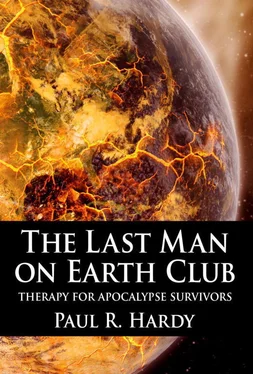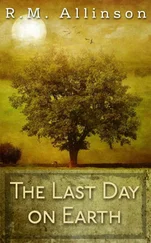“But— but— they left me all alone!”
“Oh, did they? You sure you didn’t eat them all after they dropped dead? You look like the type, butter wouldn’t melt one minute and cracking the bones for marrow the next…”
Liss recoiled, gasping, and fled the room. Olivia eyed an increasingly pale Iokan. “Ooh, and you know, now I think of it, I could really do with a calf joint, they always came up nice with a bit of rosemary, especially if you leave the juices running a bit…”
Iokan held his nerve. Pew did not. He clutched his mouth and ran for the door. We heard a nearby lavatory swish open. Olivia laughed.
“That’s enough,” I said. “The session’s over.”
PART TWO — INDIVIDUAL THERAPY
Working with the group of lone survivors had taken me away from my normal duties: the care of refugees from dead or dying worlds. Every few years we discover a universe in which the Earth has been struck by an asteroid, or burnt by a flood basalt eruption, or baked with gamma rays, or frozen in a sudden ice age, and that’s before you count all the ways humanity can destroy the world. Every human species is different, and sometimes it seems each one invents a new way to start an apocalypse.
In most of the worlds suffering some such disaster, millions of people would need to be transported to safety. Many of them would be injured, often both physically and psychologically. My usual task during an evacuation was to make psychiatric assessments of survivors who had been referred by the medical staff when they conducted their first triage of newcomers. Then, after the majority had moved on to empty worlds provided by the IU, I would conduct group and individual therapy with those who were too disturbed to join the rest of their species. For now, even that had wound down and we were fortunate enough to be able to devote resources to projects such as the group of lone survivors, though that was not the only factor motivating the creation of the group.
I hoped we would be free of evacuations for a good while yet, but nevertheless kept an eye on the apocalypse watch maintained by the Refugee Service: Llorissa was recovering from its nuclear war and the people were still desperately trying to make a go of it on their battered, irradiated world; on Steteryn the glaciers advanced day by day but the mediaeval societies living two thousand kilometres to the south refused to believe the world was ending; Ardëe’s perennial solar flares were building again but the scientists there were certain the threat wasn’t serious; Schviensever still fought its war against the comets swarming through the solar system, trying to preserve their ancient world in the face of an almost inevitable doom, but even they were doing relatively well for the moment. Any of these worlds could request an evacuation and the IU would certainly respond, but none seemed likely in the next few years. And it was very possible that my new patients would need that time.
Usually when I begin a new group, I have a very clear idea what my patients are suffering from, and therapy can begin immediately. For species with a full medico-genetic map, psychosurgery can alleviate their problems swiftly and they’re usually ready to move on after a month of observation. For others, we resort to older, more gradual methods, and it’s there that my expertise lies. Post-Traumatic Stress Disorder and related conditions are the primary issue for most apocalypse survivors, for which exposure therapy is the key treatment: slowly acclimatising the patient to the horror of their own memories until they no longer hold the same debilitating power over them. I have a whole sheaf of techniques to make it easier on the patient, and group therapy provides the support of peers who share the same terrible experience, reinforcing the individual therapy and giving them the company of people who understand what they’re going through — vital because many PTSD patients are unwilling to open up to people who have not shared their particular horror.
But before we can embark on therapy, we need a diagnosis. There’s no point in beginning exposure therapy if we don’t know which memories are causing the problem, and patients are often unwilling to speak of the horrifying events that created those memories in the first place. They may also suffer from other injuries suffered during the apocalypse, or have complications resulting from pre-existing conditions, making diagnosis vital to ensure we don’t make the situation any worse. Under normal circumstances, the process is made easier by the larger numbers of survivors, who can both support each other and help us understand common problems among their species. Sometimes there are even medical professionals among the survivors, whose assistance can be invaluable; and if we’re really lucky, medical and psychiatric records might survive the apocalypse, allowing us to build on pre-existing diagnoses. Further down the road, having a large enough group from the species makes it possible to build a medico-genetic map which can enable treatment for all but the most dedicated of sufferers.
I had none of these advantages with my current group. They shared a unique experience of loss which we hoped would bring them together, but each had suffered their loss in a very different way, and it was just as likely they would be driven apart. I had psychomedical histories for those who had been on Hub for some time, but their resistance to previous attempts at therapy suggested deeper problems as yet undiagnosed. And of course, it would be virtually impossible to create a medico-genetic map with only a single surviving member of a species to draw upon, meaning we could not risk the subtle procedures used to treat psychiatric conditions.
Each of them was very special, and very different. I would be lucky to understand and diagnose their problems within the next few months, let alone begin effective courses of therapy.
PSYCHOMEDICAL HISTORY — SUMMARY
KWAME VANGONA
Kwame was discovered in a hibernation unit on a world that had suffered complete nuclear devastation approximately ninety years previously, leaving him as the only survivor of his species. He emerged with minor brain damage, either through the revival procedure or from hibernation itself.
After transfer to Hub, Kwame was diagnosed with severe aphasia. He retained some ability to express himself in written language, and, despite some loss of dexterity, was able to identify himself as the President of the nation of Mutapa, and discover he was the only survivor of his world. This revelation provoked reactions of grief and depression, which lasted several weeks. Eventually, he assented to cautious neurological treatment and physical therapy which restored his power of speech and much of his physical co-ordination, with the exception of fine motor skills. His left arm is particularly afflicted due to a pre-existing injury acquired during military service.
Soon after his arrival on Hub, Kwame began to suffer nightmares. He reported that he witnessed, night after night, the death of his wife, but was unable to give specifics as to what exactly he saw during the nightmares. An exaggerated startle response was observed, along with flashbacks and reticence when discussing the events leading up to the end of his world. While continuing with physical therapy, he became psychologically withdrawn, and often commented that it was impossible to explain his experiences to people who had not been there. A diagnosis of PTSD was made, and he was referred to a specialist.
After a year of therapy, Kwame made the admission that, as President of his nation, he had set in train the events that led to the nuclear holocaust, and believed himself to be personally responsible for the extinction of his species. However, this did not lead to therapeutic progress but instead to a declaration that he wished to be prosecuted for genocide and punished accordingly. His legal case has been stalled for some time, and although he attends therapy sessions, he seems unable to make progress while the case is still pending.
Читать дальше












